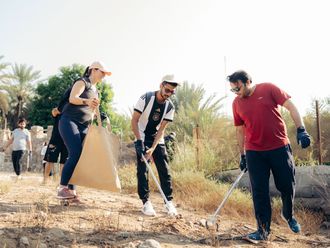Abu Dhabi: Although improvements in parking are being made throughout the city, residents say that some areas are still subject to the same problems of parking even after the launch of Mawaqif in 2009. Mawaqif is designed to provide a world-class car parking management system in the capital.
A former tenant of Hamdan Street who moved to the Khalidiya area only recently, however, feels that nothing has changed for her since parking remains a problem that hinders her from visiting family and friends.
“It is almost impossible to find parking after 8pm in my area,” she says. “I have to sometimes park quite far away and, because of that, I think twice about visiting my cousins or friends.”
Sandra Zahir, 51, an official at a school in Abu Dhabi, says, “If I finish work at 7pm, then decide to go shopping and rest for an hour, it’s 9pm already and I have to consider the fact that I will not be able to park in the residents’ area.” The long-term Abu Dhabi resident suggests that different sections be apportioned for residents and visitors in parking lots in residential areas.
“I find it ridiculous to pay for a resident’s permit when I am not guaranteed a parking space. I think that there aren’t enough residential parking spots and the authorities should consider providing one parking spot per resident at the least,” she says. “I would understand if I am a visitor and have parked in a resident-only spot and as a result get a violation [ticket] because there was space available for me as a visitor to park but I ignored it,” she added. But as things stand in Abu Dhabi, many who have residential parking permits often are unable to find spots in their own areas and therefore resort to parking in premium parking bays and pay the hourly tariff of Dh3 per hour.
Meanwhile, commercial hotspots like bakeries, for example, where people usually make a brief stopover to pick up some food, face a lot of congestion as motorists resort to double parking outside these places in a bid to avoid looking for a parking spot and paying the hourly charge.
Such daily challenges of parking have made residents propose the idea that in such busy but important areas a different tariff structure be imposed. Such as Dh0.5 or Dh0.25 for short periods of time — 15- or 30-minute periods.
Many residents who come to the city to run errands have expressed concern over the lack of parking spots in areas that require brief stopovers.
A Bani Yas-based pharmacist said that he usually ends up with a traffic violation every time he visits the city. “If you take a look at my driving record, you’ll notice that all my tickets are parking related. This is because I have a short time-frame to finish all my tasks before returning to work and I would rather double park than spend 15 minutes or more looking for a parking space just so I can run a five-minute errand,” he says.
He believes even multi-storey parking lots are impractical because they make you spend a long time just going from level to level, then taking the elevator and having to walk a long distance just to return to the same place. The time it takes to do this is sometimes longer than the time it takes to finish your errand. “It’s a waste of time,” he says. “I suggest they use the large sandy areas which are being reserved for future projects and allow people to park there even if it means charging them for it. I’d rather spend Dh20 on parking alone if it means that I find parking easily and therefore can finish my chores quickly,” he adds.
For residents in other locations such as Al Markaziya, behind Millennium Hotel on Khalifa Street, where larger parking lots are available, parking problems are not too daunting.
Communication specialist Mohammad Al Daqqaq tells Gulf News that he usually faces no parking issues after 3pm as everybody has left their offices by then. “When it’s very crowded during the day due to the large number of companies in the area, you need 10-15 minutes to find a spot. Otherwise, life is good and there are no problems. Of course, when you park far away from your house, you have to endure the long walk in the heat but that does not happen often,” he says.










